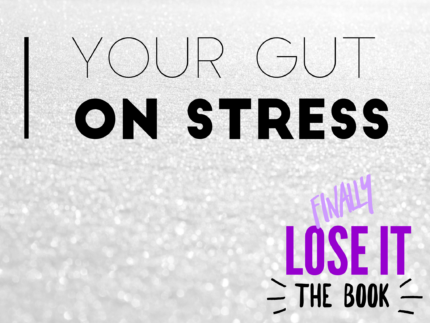When was the last time you sat down undistracted to eat all of your meals for the day? I don’t mean scarf down your food in less than five minutes before you race out the door. I’m talking about preparing your food, sitting down for more than 20 minutes to enjoy it and savouring every bite. In an ideal world every single meal would be as close to that scenario as possible, but the every day stresses of life get in the way. Did you know that your weight loss resistance, bloating, gas, and undigested food in your stools could be the result of not slowing down to eat a meal? This problem is so prevalent in our society and I want to help you change this habit.
The stress-digestion connection
We have two different nervous systems, one is rest and digest, the other, fight or flight. When we’re in ‘rest and digest’ our body can do exactly that – digest. The right digestive enzymes are produced, our liver and gallbladder produce bile to breakdown fat, stomach acid is formed, the pancreas releases insulin to balance blood sugar, and proper absorption of nutrients occur in our intestines. When we’re racing through our meals on the other hand, the digestive picture does not look so pretty. There are fewer enzymes produced, very little bile is released, the stomach doesn’t make enough acid, we have poor blood sugar control and there is poor absorption of nutrients. Doesn’t knowing this alone make you want to take an extra 10 minutes to sit and enjoy your food?
Leaky gut and stress
When you remain in a stressed state during meals, your body reacts by producing insufficient digestive enzymes, bacterial imbalances, and you can also get an increase in intestinal permeability, otherwise known as leaky gut. Picture your small intestine as fingerlike projections covered in cheesecloth. Those fingers, known as villi, are where your nutrients are absorbed, and the cheesecloth protects the villi from large pieces of undigested food and large proteins. When large proteins come into contact with the immune system of the villi, a lot of inflammation can result. With leaky gut, the normally tightly woven cheesecloth comes apart, leaving bigger holes and more room for large food proteins to squeeze through.
Do you have leaky gut?
The most common first sign of leaky gut is inflammatory reactions to foods. Have you ever eaten a food and had no problem with it until one day, after not eating it for a while, that same food gives you aches and pains, possibly a stuffed-up nose, a headache, bloating, diarrhea, or a skin reaction? These could be signs of intestinal permeability.
How does sitting down to both chew and enjoy your food sound now? As we’ve talked about in the past, gut health is key in tackling weight loss resistance and ensuring an optimal digestion is one piece to the puzzle. My favourite part about talking about the impact of stress on digestion is that it is so easy for YOU to take control of right now. I love when my patients are in control of their own health and I get to guide them on their journey. If you want to assess your digestion, work with your naturopathic doctor or medical doctor to learn more. You can also read much more about the link between digestive health and weight loss in my new book, Finally Lose It. I’d love to hear what you learn!

